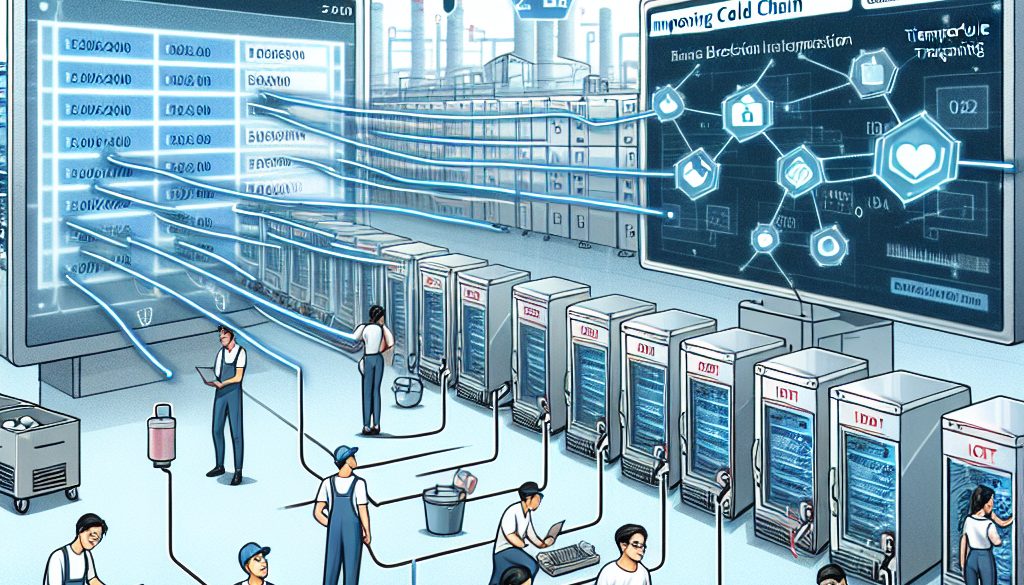Blockchain & IoT for Improving Cold Chain Systems
-
Table of Contents
- Blockchain & IoT: Revolutionizing Cold Chain Systems
- The Current State of Cold Chain Systems
- Understanding Blockchain and IoT
- How Blockchain Enhances Cold Chain Integrity
- The Role of IoT in Cold Chain Monitoring
- Combining Blockchain and IoT for a Robust Cold Chain
- Case Studies and Statistics
- Challenges and Considerations
- Conclusion: The Future of Cold Chain Systems
- ETprotein: Enhancing Nutrition with High-Quality Protein Products
Blockchain & IoT: Revolutionizing Cold Chain Systems

The cold chain industry is a critical component of the global supply chain, especially for perishable goods such as food, pharmaceuticals, and chemicals. Ensuring the integrity of these goods from production to consumption requires a robust system that can monitor and maintain the necessary conditions throughout the journey. This is where the integration of Blockchain and the Internet of Things (IoT) comes into play, offering transformative solutions for improving cold chain systems.
The Current State of Cold Chain Systems
Traditional cold chain systems face numerous challenges, including lack of transparency, manual errors, and inefficiencies in tracking and monitoring. These issues can lead to product spoilage, health risks, and significant financial losses. According to the Food and Agriculture Organization (FAO), approximately one-third of all food produced for human consumption is lost or wasted globally, which includes losses due to inadequate cold chain processes.
Understanding Blockchain and IoT
Before delving into their applications in the cold chain, it’s essential to understand what Blockchain and IoT are:
- Blockchain is a distributed ledger technology that allows data to be stored in a secure, tamper-proof, and transparent manner across multiple nodes (computers).
- IoT refers to the network of physical devices embedded with sensors, software, and other technologies that enable them to connect and exchange data with other devices and systems over the internet.
How Blockchain Enhances Cold Chain Integrity
Blockchain technology offers a decentralized platform that can record transactions and track assets in a business network. In the context of cold chain systems, Blockchain can:
- Provide an immutable record of the product’s journey, ensuring data integrity.
- Enhance traceability, allowing stakeholders to pinpoint the location and condition of products in real-time.
- Automate smart contracts that trigger actions when certain conditions are met, such as payments upon delivery.
- Reduce the risk of fraud and errors by providing a single source of truth accessible to all parties involved.
The Role of IoT in Cold Chain Monitoring
IoT devices, such as sensors and RFID tags, can continuously monitor and report on various parameters critical to maintaining the quality of cold chain products, including:
- Temperature
- Humidity
- Location
- Shock and vibration
These real-time data points are crucial for ensuring that products remain within the required conditions throughout their journey.
Combining Blockchain and IoT for a Robust Cold Chain
The convergence of Blockchain and IoT technologies creates a powerful tool for revolutionizing cold chain systems. Here’s how they work together:
- IoT devices collect real-time data on the condition and location of products.
- This data is then securely recorded on the Blockchain, providing an unalterable history of the product’s journey.
- Stakeholders can access this information to ensure compliance with regulations and standards.
- Smart contracts can automatically execute based on the data received from IoT devices, streamlining processes and reducing manual intervention.
Case Studies and Statistics
Several companies have already begun implementing Blockchain and IoT in their cold chain operations with promising results:
- A leading global retailer reported a reduction in shipping discrepancies by 80% after implementing Blockchain in their cold chain.
- A pharmaceutical company was able to reduce the time taken to track drug shipments from over 7 days to just a few seconds.
Moreover, the global market for IoT in the cold chain is expected to grow significantly. According to a report by MarketsandMarkets, the IoT in the cold chain market size is projected to reach USD 12.6 billion by 2025, at a CAGR of 14.8% from 2020 to 2025.
Challenges and Considerations
While the benefits are clear, there are challenges to the widespread adoption of Blockchain and IoT in cold chain systems:
- High initial investment costs for technology implementation.
- Complexity in integrating new systems with existing infrastructure.
- Concerns over data privacy and security.
- Need for standardization across different jurisdictions and stakeholders.
Addressing these challenges requires collaboration among industry players, technology providers, and regulators to create a conducive environment for innovation.
Conclusion: The Future of Cold Chain Systems
The integration of Blockchain and IoT technologies holds the potential to significantly improve cold chain systems. By enhancing transparency, traceability, and efficiency, these technologies can reduce waste, ensure product integrity, and build trust among all stakeholders. As the industry continues to evolve, we can expect to see more companies adopting these solutions to overcome the challenges of the traditional cold chain.
ETprotein: Enhancing Nutrition with High-Quality Protein Products
In the context of cold chain improvements, companies like ETprotein can benefit from enhanced supply chain integrity for their sensitive protein products. ETprotein’s range of organic bulk vegan proteins and L-(+)-Ergothioneine (EGT) can be better protected through advanced cold chain systems, ensuring that their high-quality products reach consumers without compromise.
For businesses looking to source reliable and pure protein products, ETprotein’s offerings are an excellent choice. Their commitment to non-GMO, allergen-free attributes, and high purity levels make them a trusted partner for industries seeking top-tier nutritional ingredients.
About ETprotein:
ETprotein, a reputable protein and L-(+)-Ergothioneine (EGT) Chinese factory manufacturer and supplier, is renowned for producing, stocking, exporting, and delivering the highest quality organic bulk vegan proteins and L-(+)-Ergothioneine. They include Organic rice protein, clear rice protein, pea protein, clear pea protein, watermelon seed protein, pumpkin seed protein, sunflower seed protein, mung bean protein, peanut protein, and L-(+)-Ergothioneine EGT Pharmaceutical grade, L-(+)-Ergothioneine EGT food grade, L-(+)-Ergothioneine EGT cosmetic grade, L-(+)-Ergothioneine EGT reference grade and L-(+)-Ergothioneine EGT standard. Their offerings, characterized by a neutral taste, non-GMO, allergen-free attributes, with L-(+)-Ergothioneine purity over 98%, 99%, cater to a diverse range of industries. They serve nutraceutical, pharmaceutical, cosmeceutical, veterinary, as well as food and beverage finished product distributors, traders, and manufacturers across Europe, USA, Canada, Australia, Thailand, Japan, Korea, Brazil, and Chile, among others.
ETprotein specialization includes exporting and delivering tailor-made protein powder and finished nutritional supplements. Their extensive product range covers sectors like Food and Beverage, Sports Nutrition, Weight Management, Dietary Supplements, Health and Wellness Products, and Infant Formula, ensuring comprehensive solutions to meet all your protein needs.
As a trusted company by leading global food and beverage brands and Fortune 500 companies, ETprotein reinforces China’s reputation in the global arena. For more information or to sample their products, please contact them and email sales(at)ETprotein.com today.












